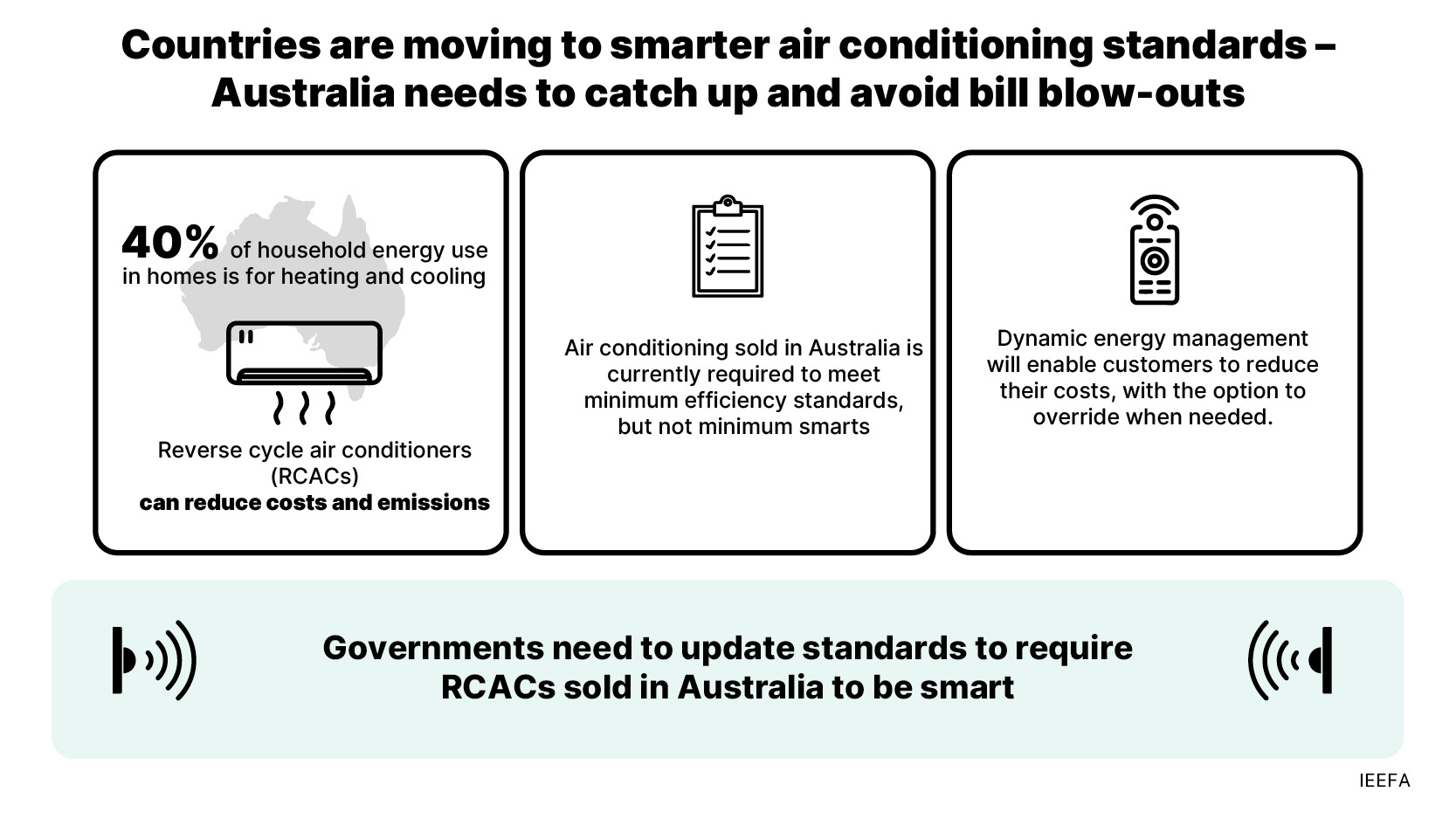Making air conditioners smart could cut household energy bills

Other countries are moving to smarter AC standards – Australia needs to catch up
Key Takeaways:
Space heating and cooling is a major contributor to household energy bills, so smarter, more efficient electric reverse cycle air conditioners (RCACs) could reduce costs as well as emissions.
Air conditioning sold in Australia is currently required to meet minimum efficiency standards, but not minimum smarts.
The availability of cheap Wi-Fi controllers makes it cost-effective to require all RCACs to be smart – able to have their energy use dynamically managed, with customers able to override this as needed.
Governments should consider subsidising a variety of low-cost add-on sensors and devices to make existing RCACs smart.
22 October 2024 (IEEFA Australia): Australian consumers could make significant savings on their household heating and cooling bills by switching to smarter, more efficient electric reverse cycle air conditioners (RCACs), according to new research from an independent energy think tank.
The Institute for Energy Economics and Financial Analysis (IEEFA) recommends that governments in Australia establish standards that require new RCAC systems to be ‘smart’ – enabling their energy use to be dynamically managed. In addition, governments should consider subsidising availability of add-on sensors and devices to make existing RCAC units smart.
“At the moment, air conditioning products sold in Australia are required to meet minimum efficiency standards, but not minimum smarts,” says Dr Gabrielle Kuiper, IEEFA guest contributor and author of the new briefing note, Smart air conditioners could reduce energy bills for consumers.
“As increasing numbers of homes electrify their heating to reduce their energy bills and lower their emissions, ensuring that RCACs can be used as flexible demand will be an important way to help lower costs for consumers, improve the operation of the electricity grid, and reduce emissions.”
Heating and cooling accounts for about 40% of an average Australian home’s energy use. RCACs are the most commonly installed cooling technology in Australian home; they are also the most energy-efficient heater and cooler of all types, irrespective of fuel source. According to the CHOICE database, the majority of air conditioners available today have Wi-Fi control, as standard or optional.
“Two of the largest energy retailers in Australia are already offering opportunities for households with smart meters to earn rewards for voluntarily flexing their electricity use at times of peak demand,” says Dr Kuiper. “Our research shows a strong public appetite for these schemes. They not only reduce household energy costs. Demand flexibility can also help to minimise whole-of-system costs, which will become increasingly important as Australia transitions to greater levels of variable renewable energy generation.”
In addition, many existing RCAC units can be managed remotely through the addition of relatively inexpensive smart thermostats. Government schemes to encourage take-up of these devices would further expand the flexible demand potential from electrified heating and cooling.
“It is important to note that these are all relatively low-cost measures,” adds Dr Kuiper. “The technology required to make a new or existing RCAC smart is cheap. And the development of platforms to reward demand flexibility is inexpensive compared to the costs of building new electricity generation and network infrastructure.”
Overseas there are a number of current and planned moves towards ‘smart appliances’, with new standards coming into force in the US, the UK and Europe. As a result of these international trends, we can expect to see an increasing number of smart appliances, including RCACs, available for import into Australia.
“The direction of travel internationally is clear: towards smart AC,” says Dr Kuiper. “Therefore it is critical to have the right standards in place as soon as possible. The public appetite to reduce bills through flexible demand exists. It is up to Australian governments to make it easier for consumers by normalising the sale of smart, efficient heating and cooling technology.”
Read the report: Smart air conditioners could slash energy bills for consumers
Media contact: Amy Leiper [email protected] +61 (0) 414 643 046
About IEEFA: The Institute for Energy Economics and Financial Analysis (IEEFA) examines issues related to energy markets, trends, and policies. The Institute’s mission is to accelerate the transition to a diverse, sustainable and profitable energy economy. (ieefa.org)













